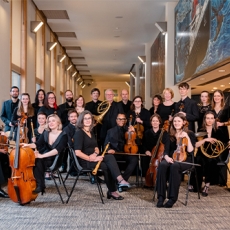Dunedin Consort - Handel: Messiah - Choral Journal
In his liner notes for Messiah, John Butt asks the question, "why the Dublin version?" Which raises the question, "why another recording of any version?" In recording the 1742 Dublin version (the first of all Messiah performances), Butt offers us insight not only into Handel's working methodology, but also into alternative movements which may be of use to the choir director interested in performing something familiar, yet not, from this most enduring of works.
In a gentle nod to Richard Taruskin, Butt notes that recording the Dublin version does not necessarily mean "we are presenting the work in its ‘best' or indeed in its entirely ‘original' form." All this reminds us that there can be no definitive version of Messiah. Handel always tailored his performances to the forces at hand. Realizing that his Dublin soloists were not of London caliber, he simplified, deleted, and arranged movements to suit the situation. The Dublin orchestra consisted only of strings, two trumpets, timpani, and harpsichord (Handel had his organ transported to Ireland for the performances). He didn't ask that oboes be hired, but worked with the forces at hand. We might take a broader lesson from his example, when next confronted by an "urtext" score demanding, say, offstage ophicleides or pairs of serpents.
For Dublin, Handel also:
- presented Rejoice, greatly as a full da capo aria in 12/8;
- arranged a lyrical alto aria in each Part (He shall feed His flock transposed to F; He was despised; If God be for us transposed to C minor) for the noted "Mrs. Cibber";
- replaced How beautiful are the feet with a duet for two altos and chorus (Break forth into joy). (The resulting movement is a piece more church choirs should explore);
- shortened The trumpet shall sound; O death, where is thy sting; and Why do the nations;
- replaced But who may abide; Thou art gone up on high; and Thou shalt break them with recitatives;
- put in four extra measures in the ritornello to Ev'ry valley and enlarged the Pifa
- set in-cor-rup-tible in The Trumpet shall sound as in-cor-rup-tible!
Butt's sound world is ascetically pristine. All lines are clearly heard and seem to have been polished to a uniform brilliance. The Dunedin Consort and Players offer a hearty, clean performance of limited emotional and dynamic range. On the whole, the chorus sings very well. Diction is nicely articulated, although not necessarily consistent: the Hallelujah Chorus starts with a crisp King of Kings that devolves into ‘ing of ‘ings in later iterations. Yet the trill at For the Lord God is simply delicious-don't we all wish our choirs could do that?
The soloists are somewhat uneven. Soprano Susan Hamilton offers a lovely boy-soprano sound with little in the way of emotional involvement. Alto Clare Wilkinson delivers a more nuanced performance, as does bass Matthew Brook. Still, one wishes there was a more consistent expressive core to the proceedings.
Butt's tempi generally allow the music to breathe and grow. Rejoice, greatly is, however, marred by too jaunty a tempo; the resulting music-especially when it sprints headlong into the 4/4 B section-feels rushed, with no affinity for that section's contrasting emotional weight. Other movements fare better: the Amen has a wonderfully elegiac feel to it. The orchestra is actually the star of this performance. They play with stylish vigor, using an approach that balances elegance with dramatic tension.

